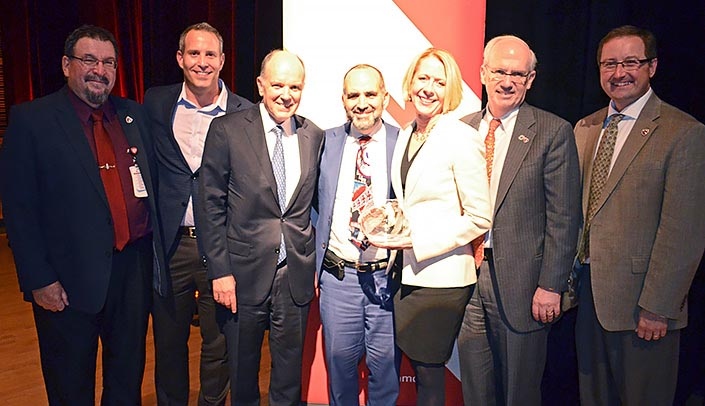Joan Squires is on a mission. She wants to find a cure for Lewy body dementia, and she's placing her faith in the neurological researchers at UNMC.
Looking for a cure
The University of Nebraska Foundation has established the Nebraska Neuroscience Alliance Endowed Award Fund to help UNMC researchers find a cure for neurological diseases such as Lewy body dementia. "It is my fervent hope that a cure can be developed, so that others don't have to experience the challenges and heartbreak of this disease," said Joan Squires, whose husband, Tom Fay, died from the disease. Donations can be made here.
Squires, who is president of Omaha Performing Arts, knows all too well the challenges of Lewy body dementia. She saw it first-hand, as it took away her husband of 24 years, Tom Fay, in 2016.
Fay, who was 75, battled the disease for 14 years. Squires said it was like "saying goodbye one neuron at a time." Although he remained active for many years, it was a disease that was extremely difficult to manage and nothing could stop its progression.
Lewy body dementia is one of the most common causes of dementia. It usually begins between the ages of 50 and 85 and is progressive. There is no cure. It can be difficult to diagnose, as it has symptoms similar to Parkinson's disease. Abnormal structures, called Lewy bodies, build up in areas of the brain and affect areas that regulate behavior, cognition and movement.
Squires shared her story Nov. 2 at the annual dinner for the Nebraska Neuroscience Alliance (NNA), an organization that unites UNMC's top neuroscientists. At a dinner at the Holland Performing Arts Center attended by about 200 people, Squires saluted "the extraordinary work" of these neuroscientists and challenged them to find a cure.
The NNA has been instrumental in allowing UNMC to grow its neuroscience research program, said Chris Kratochvil, M.D., professor of psychiatry and associate vice chancellor for clinical research at UNMC and chief medical officer of UNeHealth.
He noted that UNMC's graduate student training program in the neurosciences has blossomed and is now well-positioned to gain financial support from the National Institutes of Health. This graduate training program includes six departments in the College of Medicine (pathology and microbiology, neurological sciences, pharmacology and experimental neuroscience, internal medicine, ophthalmology and visual sciences, and cellular and integrative physiology) as well as the Munroe-Meyer Institute.
At least two of the speakers acknowledged that "it takes a village" to tackle a disease like Lewy body dementia. It would definitely seem as though that village is now in place at UNMC. Game on.
